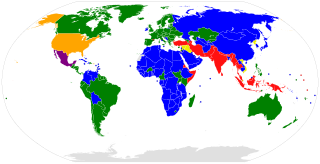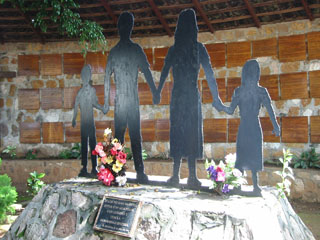Related Research Articles
Medicare is a federal health insurance program in the United States for people age 65 or older and younger people with disabilities, including those with end stage renal disease and amyotrophic lateral sclerosis. It was begun in 1965 under the Social Security Administration and is now administered by the Centers for Medicare and Medicaid Services (CMS).

The Convention relative to the Protection of Civilian Persons in Time of War, more commonly referred to as the Fourth Geneva Convention and abbreviated as GCIV, is one of the four treaties of the Geneva Conventions. It was adopted in August 1949, and came into force in October 1950. While the first three conventions dealt with combatants, the Fourth Geneva Convention was the first to deal with humanitarian protections for civilians in a war zone. There are currently 196 countries party to the 1949 Geneva Conventions, including this and the other three treaties.

The American Convention on Human Rights (ACHR), also known as the Pact of San José or by its Spanish name used in most of the signatory nations, Convención Americana sobre Derechos Humanos, is an international human rights instrument. It was adopted by many countries in the Western Hemisphere in San José, Costa Rica, on 22 November 1969. It came into force after the eleventh instrument of ratification was deposited on 18 July 1978.
A disability pension is a form of pension given to those people who are permanently or temporarily unable to work due to a disability.
The Freedom of Association and Protection of the Right to Organise Convention (1948) No 87 is an International Labour Organization Convention, and one of eight conventions that form the core of international labour law, as interpreted by the Declaration on Fundamental Principles and Rights at Work.
The Right to Organise and Collective Bargaining Convention (1949) No 98 is an International Labour Organization Convention. It is one of eight ILO fundamental conventions.

Indigenous and Tribal Populations Convention, 1957 is an International Labour Organization Convention within the United Nations that was established in 1957. Its primary focus is to recognize and protect the cultural, religious, civil and social rights of indigenous and tribal populations within an independent country, and to provide a standard framework for addressing the economic issues that many of these groups face.
Occupational Health Services Convention, 1985 is an International Labour Organization Convention.
Chemicals Convention, 1990 is an International Labour Organization Convention.
Human rights in the Philippines are protected by the Constitution of the Philippines, to make sure that people in the Philippines are able to live peacefully and with dignity, safe from the abuse of any individuals or institutions, including the state.
Sick leave is paid time off from work that workers can use to stay home to address their health needs without losing pay. It differs from paid vacation time or time off work to deal with personal matters, because sick leave is intended for health-related purposes. Sick leave can include a mental health day and taking time away from work to go to a scheduled doctor's appointment. Some policies also allow paid sick time to be used to care for sick family members, or to address health and safety needs related to domestic violence or sexual assault. Menstrual leave is another type of time off work for a health-related reason, but it is not always paid.
The Labor Code of the Philippines is the legal code governing employment practices and labor relations in the Philippines. It was enacted through Presidential Decree No. 442 on Labor day, May 1, 1974, by President Ferdinand Marcos in the exercise of his then extant legislative powers.

Social security is divided by the French government into five branches: illness; old age/retirement; family; work accident; and occupational disease. From an institutional point of view, French social security is made up of diverse organismes. The system is divided into three main Regimes: the General Regime, the Farm Regime, and the Self-employed Regime. In addition there are numerous special regimes dating from prior to the creation of the state system in the mid-to-late 1940s.
Iranian labor law describes the rules of employment in Iran. As a still developing country, Iran is considerably behind by international standards. It has failed to ratify the two basic Conventions of the International Labour Organization on freedom of association and collective bargaining, and one on abolition of child labor. Countries such as the US and India have also failed to ratify many of these Conventions and a mere 14 other Conventions, only 2 since the Islamic Revolution.

The Maritime Labour Convention (MLC) is an International Labour Organization (ILO) convention, number 186, established in 2006 as the fourth pillar of international maritime law and embodies "all up-to-date standards of existing international maritime labour Conventions and Recommendations, as well as the fundamental principles to be found in other international labour Conventions". The other pillars are the SOLAS, STCW and MARPOL. The treaties applies to all ships entering the harbours of parties to the treaty (port states), as well as to all ships flying the flag of state party (flag states, as of 2021: over 97 per cent).

Employees' State Insurance Corporation is one of the two main statutory social security bodies under the administrative control of Ministry of Labour and Employment, Government of India, the other being the Employees' Provident Fund Organisation. The fund is managed by the Employees' State Insurance Corporation (ESIC) according to rules and regulations stipulated in the ESI Act 1948.
International labour law is the body of rules spanning public and private international law which concern the rights and duties of employees, employers, trade unions and governments in regulating Work and the workplace. The International Labour Organization and the World Trade Organization have been the main international bodies involved in reforming labour markets. The International Monetary Fund and the World Bank have indirectly driven changes in labour policy by demanding structural adjustment conditions for receiving loans or grants. Issues regarding Conflict of laws arise, determined by national courts, when people work in more than one country, and supra-national bodies, particularly in the law of the European Union, have a growing body of rules regarding labour rights.
Free, prior and informed consent (FPIC) is aimed to establish bottom-up participation and consultation of an indigenous population prior to the beginning of development on ancestral land or using resources in an indigenous population's territory. Indigenous people have a special connection to their land and resources and inhabit one fifth of the Earth's surface. Such areas are environmentally rich in both renewable and non-renewable resources. The collective ownership style of most Indigenous Peoples conflicts with the modern global market and its continuous need for resources and land. To protect Indigenous Peoples' rights, international human rights law has created processes and standards to safeguard their way of life and to encourage participation in the decision-making process. One such method is the process of FPIC. There is criticism that many international conventions and treaties require consultation, not consent, which is a much higher threshold. Without the requirement for consent, indigenous people cannot veto government projects and developments in their area that directly affect their lives and cultures. FPIC allows Indigenous Peoples to have the right to self-determination and self-governance in national and local government decision-making processes over projects that concern their lives and resources.
In Japan, a person with a disability is defined as: "a person whose daily life or life in society is substantially limited over the long term due to a physical disability or mental disability". Japan ratified the United Nations Convention on the Rights of Persons with Disabilities (CRPD) on 20 January 2014.
The Islamic Republic of Iran signed the UN Convention on the Rights of the Child (CRC) in 1991 and ratified it in 1994. Upon ratification, Iran made the following reservation: "If the text of the Convention is or becomes incompatible with the domestic laws and Islamic standards at any time or in any case, the Government of the Islamic Republic shall not abide by it."
References
- ↑ "C130 Medical Care and Sickness Benefits Convention, 1969". International Labour Organization. 1969-06-04. Retrieved 2013-04-30.